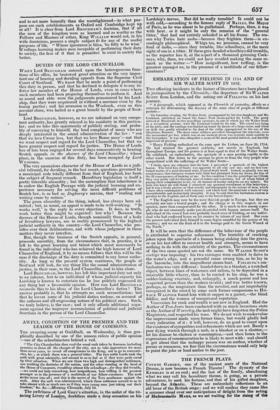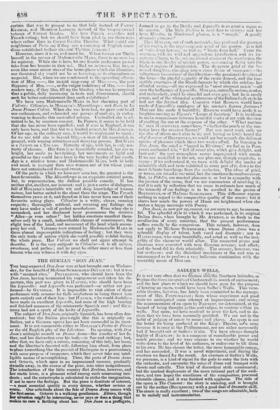THE FRENCH PLAYS.
COVENT GARDEN, one of the ancient seats of the National Drama, is now become a French Theatre! The dynasty of the IC.EhintEs is at an end; and the last of the family, abandoning what we may call his hereditary throne, is going, as a private adventurer, to seek his fortune, and that of his gifted daughter, beyond the Atlantic. These are melancholy reflections to an old lover of the British stage; and we will confess they came like a summer cloud over our anticipations of delight from the acting of Mademoiselle Wats, as we sat waiting for the rising of the curtain that was to present to us that lady instead of FA.NNV KtMBLE, &It'd. Monsieur LAPORTE instead of the long-respected Veteran. of Covent Garden. We love French comedies and Vrenchateting; but we should have been glad to see them any- Where rather than in Covent Garden Theatre. What would our .neiglabours of Paris say if they saw a company of Engli.sh come- dians established in their classical Tit:nitre Feauttais
However, since it is so, so it must be. When we can see Thalia herself in the person of Mademoiselle Maas, there is no occasion for repining. While she is here, let our female performers go and take from her lessons in their art. Had we actresses like her, or even like some minor stars of the hemisphere which she illumines, our theatrical sky would not be so lowering, (re its atmosphere so ungenial. But, when we are condemned to the sprawling affecta- tion of Miss --, the insipid sing-song of Miss --, the pert flippancy of Mrs. —, or the vulgar indelicacy of Mrs. -- (our readers may, if they like, fill up the blanks), who can be surprised that a public, daily increasing in taste and discernment, should seek for better entertainment than such exhibitions?
, We have seen Mademoiselle MARS in her charming part of Valerie; Cblizrame, in Momana's.Misantbrope; and Rose, in La -.Team Fenznze Col?re. When she was here last, we gave vent to all eurenthusiasm, and exhausted our powers of analysis, in endea- evouring to describe this unrivalled actress. Unrivalled she is ad- mitted to be, by common consent. In France, it seems to be held that she has never been equalled ; and if ever in England, it can only have been, and that but to a limited extent, by Mrseloarasse • Of her age, in the ordinary ease, it would be unpleasant to speak ; for we are told she is beyond lifty,—a time of life associated; in general, with waning attractions and decaying powers. But Maas is a NINON DE L'INCLOS. Maturity of age, with her, is only ma- turity of charms. Her form is as beautifully rounded, her eve as bright, her smile as bewitching, her movements as light and graceful as they could have been in the very heyday of her youth. Age is a relative term; and Mademoiselle MARS, both in body and mind, is younger than nine women out of ten whose years have not outnumbered fire-and-twenty.
Of the parts in which we have now seen her, the greatest is the least favourable. The Misanthrope is an exquisite satirical poem, but, in representation, the dullest possible comedy. It has neither plot, incident, nor interest; and is just a series of dialogues, full of MOLIERE'S inimitable wit and deep knowledge of human nature, but better suited to the closet than the stage. The French themselves yawn at it, and therefore it has never been one of their favourite acting plays. Celim4)ne is a witty, clever, cunning coquette ; thoroughly artificial, and covering any feelings she may have under a veil of perfect nonchalance. Even when she is unmasked, and her disabused lover pronounces the decisive " Allez—je vous refuse!" her hidden emotions manifest them- selves only by a small, indescribable change of countenance, the slight toss of the hand, and movement of the head which accom- pany her exit. Volumes were uttered by Mademoiselle MARS in these almost imperceptible indications of feeling ; but they were the only traits of nature which she could possibly exhibit during the whole piece. Her VIM rie we shall not again attempt to describe. It is the very antipode to Mimi:no—it is all nature, sweetness, and pathos ; and he must he either more or less than human who can witness it with dry eyes.



























 Previous page
Previous page